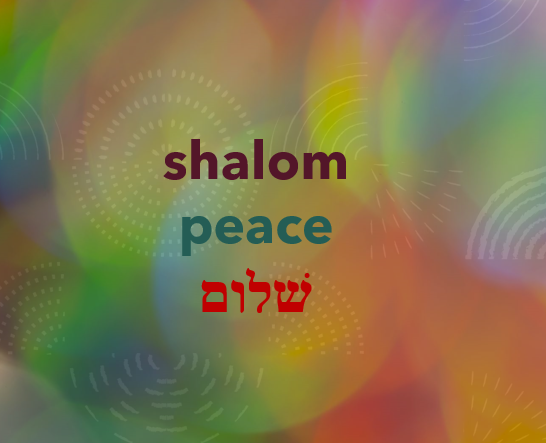Sign up to our mailing list

Shalom שׁלום
You’re probably familiar with the Hebrew word shalom. It’s a common greeting in ancient and modern Israel. In today’s world, shalom is used to say “hi”, “welcome”, or “goodbye”. In Hebrew thought, greeting shalom really means “may you be full of well-being”. Rav Shaul of Tarsus (apostle Paul ) greeted congregations in his letters: “shalom from God our Father and the Lord Yeshua the Messiah.” that is, “May you be full of well-being from God our Father and the Lord Yeshua the Messiah”.
In English, we translate shalom as peace, which in our Western mind simply means the absence of war. But what about cold war or silent hostility? Would such calm and absence of violence be considered shalom? Psalm 120:7 says, “I am for peace and thus I speak, but they are for war!”. The contrasting juxtaposition of war and peace reveals war not only to be the presence of violence, but lack of well-being. Even where open violence does not exist, if parties deliberately work against the well-being of the other, shalom is absent.
Shalom comes from the root word “shalam”, which means “to restore” that is, to restore to wholeness, completeness, or wellbeing. In Rabbi Yeshua’s teachings on the mount, he taught “blessed are the peacemakers, for they shall be called sons of God”. Did He refer to mediators or political negotiators as being blessed? Although these people do such a noble deed, the great Rabbi meant peacemakers to be people bringing wholeness back to an otherwise incomplete and broken world.
Our world has been enduring varying degrees of turmoil, suffering, pain, and every sense of “lack” since man’s fall from God’s glory in the Garden. At times, suffering remains invisible until one takes a closer look beyond the surface and with a loving eye. When the psalmist enjoins us to “seek peace and pursue it” (Psalm 34:14b), God desires that we actively look for things that are lacking (for example, health, protection, provision, safety, sustenance), and then help restore and repair them to wholeness. A warm smile we make can be a healing balm to a hurting soul. Such simple acts of kindness bring comfort and repair to another’s wellbeing in one way or another.
Tikkun olam (pronounced teek-oon ow-lam) is a Hebrew concept that literally means repairing the world. Tikkun olam is when a person acts in GOD’s behalf as extension of His hands and feet to help restore broken people back to some degree of wholeness. The Good Samaritan is a notable example Rabbi Yeshua gave for a peacemaker. The Good Samaritan took notice and stopped, bandaged and oiled the injured man’s wounds, carried and brought him to an inn, took care of him, commissioned a caretaker and left money to pay for the man’s stay at the inn until he was fully restored. What the Good Samaritan did was a model for tikkun olam; he acted as a peacemaker and put the second greatest commandment of loving one’s neighbour as oneself into action. By Rabbi Yeshua’s definition, this Good Samaritan is blessed and to be called son of God.
Compassion is the main driver for seeking and pursuing shalom. Compassion moved the Good Samaritan to rescue the injured stranger: “But a Samaritan…noticed the man, he felt compassion.” (Luke 10:33). Compassion stirred Moses to stand as peacemaker between GOD and Israel: “Alas, these people have sinned greatly, and made gods of gold! Yet now, please forgive their sin. But if not, please blot me out of Your book that You have written.” (Ex. 32:31-32) It was out of a heart of compassion that Rav Shaul of Tarsus grieved for the restoration of his people: “that my sorrow is great and the anguish in my heart unending. For I would pray that I myself were cursed, banished from Messiah for the sake of my people—my own flesh and blood…” (Romans 9:2-3). In this sense, the opposite of seeking and pursuing shalom is apathy--that lack of concern, hardness of heart, and absence of burden for others.
Rabbi Yeshua, the greatest peacemaker, had compassion for the multitudes when he saw them “harassed and helpless, like sheep without shepherd” (Matthew 9:36). He had compassion over Jerusalem and wept over it (Luke 19:41). Rabbi Yeshua performed tikkun olam and brought shalom to people, healing and restoring the lost, oppressed, sick, and needy.
When Messiah Yeshua declared to His disciples “Peace I leave with you, My peace I give to you; not as the world gives do I give to you”, He spoke of restoring wholeness in our souls, that complete wellbeing in relationship with Him. He spoke about Himself bringing restoration and reconciliation to our strained relationship with God, which only He is truly able to perform. It’s such a marvelous thing.
Have you experienced the shalom of GOD that transcends all understanding? Do you have a burden for the lost and desire that they too experience the shalom of GOD?
Hope you enjoyed our Hebrew vocabulary today. Till next time. Shalom!
Read about Longsuffering.
Read about Joy.

